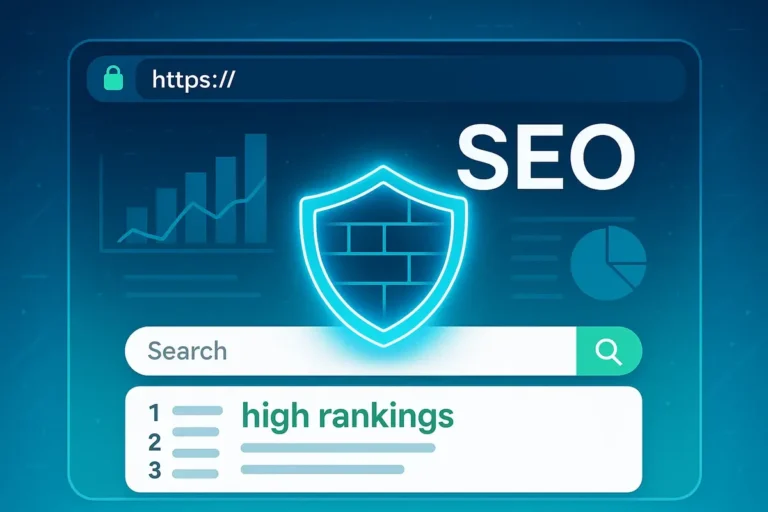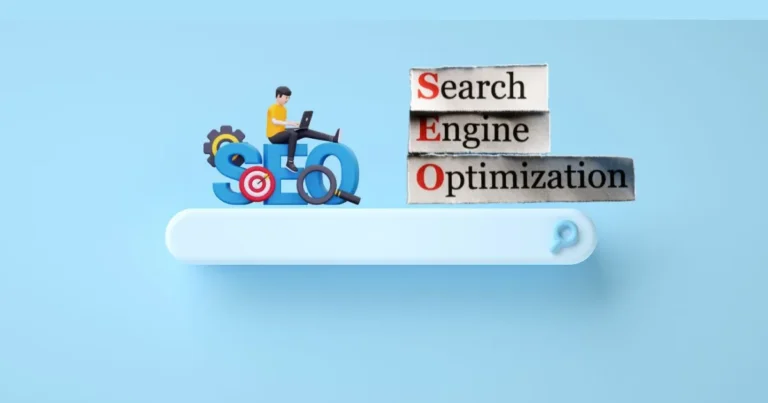SEO Meets Cybersecurity: How to Build a Secure Website That Ranks Higher
Imagine pouring your heart into creating a beautiful website—writing the perfect blog posts, choosing stunning images, optimizing every tag like a wizard… only to wake up one morning and discover it’s been hacked and blacklisted by Google. 😱
Yeah, ouch.
That, my friend, is the day you learn that a secure website SEO strategy isn’t optional—it’s essential. Because what’s the point of reaching the top of Google if your site is so vulnerable it gets pushed off the cliff the next day?
Good SEO isn’t just about keywords and backlinks anymore. Today, Google cares just as much about how safe your site is as it does about how fast it loads or how relevant your content is. That’s where secure website SEO comes into play.
Let’s dive into how you can build a fortress that both ranks AND resists attacks like a digital ninja. 🥷
Table of Contents
SEO Meets Cybersecurity: How to Build a Secure Website That Ranks Higher
1. Why SEO Needs Cybersecurity
Let’s keep it real. Most people think of SEO as keyword-stuffing, meta descriptions, and title tags. Meanwhile, cybersecurity sounds like firewalls, scary hackers, and passwords with at least one hieroglyphic.
But here’s the truth: these two worlds are married. Why?
- Google punishes hacked sites.
- Malware can redirect your traffic to scammy pages.
- Spammy backlinks from hackers kill your domain reputation.
- Users bounce faster than ever if they see a “Not Secure” warning.
A secure website SEO plan protects your brand’s visibility and trust. In Google’s eyes, a secure site = a trustworthy site = a higher-ranked site.
2. HTTPS: Your SEO Bodyguard
Still using HTTP? That’s like showing up to a cybersecurity conference in a hospital gown.
Install an SSL certificate and switch to HTTPS. It does three key things:
- Encrypts data between your site and the visitor.
- Removes the dreaded “Not Secure” label.
- Gives you a small but real ranking boost (Google confirmed this).
Search engines love encryption. And visitors love secure website SEO setups where they feel protected while browsing. Win-win.
3. Protect Your Site from Blacklisting
Google is like your strict-but-fair teacher. Get caught cheating (or getting hacked), and you’ll be sent to the blacklist.
That means:
- You disappear from search results.
- Your traffic drops to zero.
- Rebuilding trust with Google becomes a mountain climb.
Use tools like Google Search Console and Sucuri to monitor for:
- Malware injections
- Unusual redirects
- Suspicious code changes
Better yet, set up alerts. That way, your secure website SEO isn’t playing whack-a-mole—it’s playing chess.
4. Stop Hackers from Hijacking Your SEO
Here’s a scary trick: hackers don’t always deface your homepage. Sometimes, they add hidden spammy pages full of gambling, porn, or fake pills—all on YOUR domain.
And guess what? Google indexes that junk.
Protect your backend with:
- Two-factor authentication (2FA)
- Strong, unique passwords
- Limiting admin access
- Regular backups
- Updating plugins/themes
Clean backend = clean Google reputation = clean SEO rankings.
This is the essence of secure website SEO. You don’t just rank—you defend your rankings.
5. Secure Site Speed = SEO Power
Google loves fast websites. But speed without security? Meh.
Secure your speed with:
- A reputable hosting provider
- A CDN (like Cloudflare)
- Image compression
- No shady plugins
- Clean, efficient code
Faster, safer sites lower bounce rates and boost user satisfaction—which is gold for SEO. Because guess what? Secure website SEO means fast, stable, and secure.
6. Don’t Let Bad Bots Eat Your SEO
Search engines send good bots to crawl your site. But hackers? They send bad bots to scrape, spam, and slow you down.
Use tools like:
- reCAPTCHA (to block spammy forms)
- Firewall rules (via Cloudflare or your host)
- Robots.txt to limit what bots can access
Clean bot traffic = clean crawl budget = better rankings. It’s yet another layer of secure website SEO done right.
7. Trust Is the New CTR
Even if you’re on page 1 of Google, if users see warnings like:
- “Your connection is not private”
- “This site may harm your device”
…they bounce. Fast.
Security builds trust. Trust increases clicks. Clicks improve rankings.
Secure website SEO isn’t technical fluff—it’s part of your brand’s reputation. Show your audience you care about their safety, and they’ll reward you with visits, clicks, and conversions.
8. Bonus: Use Security as a Competitive SEO Advantage
Here’s the thing: most small businesses don’t think of security as an SEO asset.
So if you do it right:
- You stand out.
- You protect your traffic.
- You sleep better at night.
Security is invisible—until it’s not. Then it’s all that matters.
Let your competitors chase keywords. You build a fortress.
That’s secure website SEO with brains and biceps.
Final Thoughts
If your SEO plan skips security, you’re not building a future—you’re building a risk.
Whether you run a blog, a business, or an online store, secure website SEO isn’t optional anymore—it’s your digital shield. It protects your traffic, your trust, and your entire brand.
👉 Take action now and future-proof your rankings.
Visit: cybersecurityinsightx.com/secure-website-seo-2025-2026 to learn how to secure, rank, and grow—smarter.
Because in 2025–2026, SEO without security isn’t strategy. It’s sabotage. 💥
FAQ – SEO & Cybersecurity
1. What is secure website SEO?
Secure website SEO combines traditional SEO techniques with website security best practices. It protects your content, data, and search visibility from cyberattacks. A secure site loads safely for users and signals trust to search engines. It’s not just about ranking—it’s about reliability.
2. Why does website security SEO matter for Google rankings?
Google favors secure, trustworthy websites in its algorithm. Website security SEO ensures your site avoids penalties from malware, phishing, or blacklisting. It reduces bounce rate by preventing scary warnings like “This site may harm your device.” A secure site leads to higher engagement—and better rankings.
3. How does a cybersecurity SEO strategy protect your traffic?
A strong cybersecurity SEO strategy protects your site from spam injections, malicious redirects, and stolen traffic. Without protection, your SEO efforts can be hijacked in silence. Hackers exploit weak sites to push fake content and sabotage rankings. Security is your invisible armor in search visibility.
4. What are the benefits of SEO site protection?
SEO site protection prevents loss of rankings, traffic drops, and search engine penalties. It keeps your domain clean and your reputation intact. It also builds trust with users who care about privacy and data protection. In short, it protects both your brand and your Google position.
5. Does HTTPS SEO impact ranking?
Yes—HTTPS SEO impact is confirmed by Google as a minor but real ranking factor. It encrypts communication between your users and your server. More importantly, it removes browser warnings like “Not Secure” that scare visitors away. Switching to HTTPS is an easy SEO win.
6. Can a hacked site hurt your SEO?
Definitely. A hacked site may display spam, redirect users, or get blacklisted by Google. That means losing all your SEO progress overnight. Secure website SEO prevents such attacks and helps you recover faster if something goes wrong. SEO is fragile without security.
7. Is SSL part of website security SEO?
Yes, SSL is the foundation of website security SEO. It activates HTTPS, which encrypts data and tells Google your site is safe. It’s essential for e-commerce sites, login forms, and contact pages. Without SSL, you risk losing both user trust and rankings.
8. How often should I update my cybersecurity SEO strategy?
Update your cybersecurity SEO strategy every 3 to 6 months or after any major platform change. That includes plugin updates, new features, or CMS upgrades. Frequent checks help spot vulnerabilities early before they hurt your SEO. Prevention is cheaper than Google recovery.
9. What tools help with SEO site protection?
Tools like Sucuri, Wordfence, and Cloudflare monitor your website 24/7. They block bad bots, scan for malware, and keep hackers out. These tools are essential parts of SEO site protection, especially for WordPress or open-source sites. Think of them as your SEO security guards.
10. Is HTTPS enough for secure website SEO?
No—HTTPS is a starting point, not the full strategy. Secure website SEO also involves strong passwords, firewall rules, frequent updates, and backups. Hackers look for unpatched plugins and weak admin access. Full protection requires layered security beyond just HTTPS.







